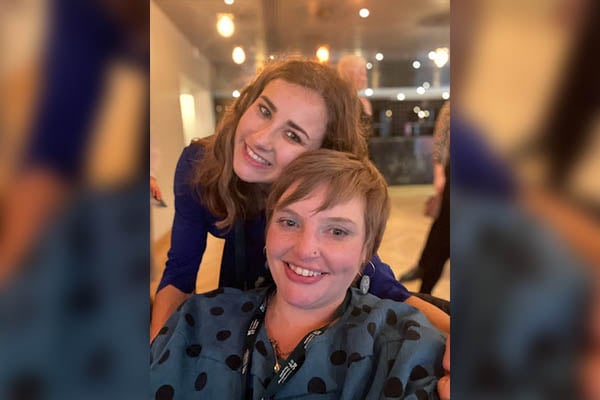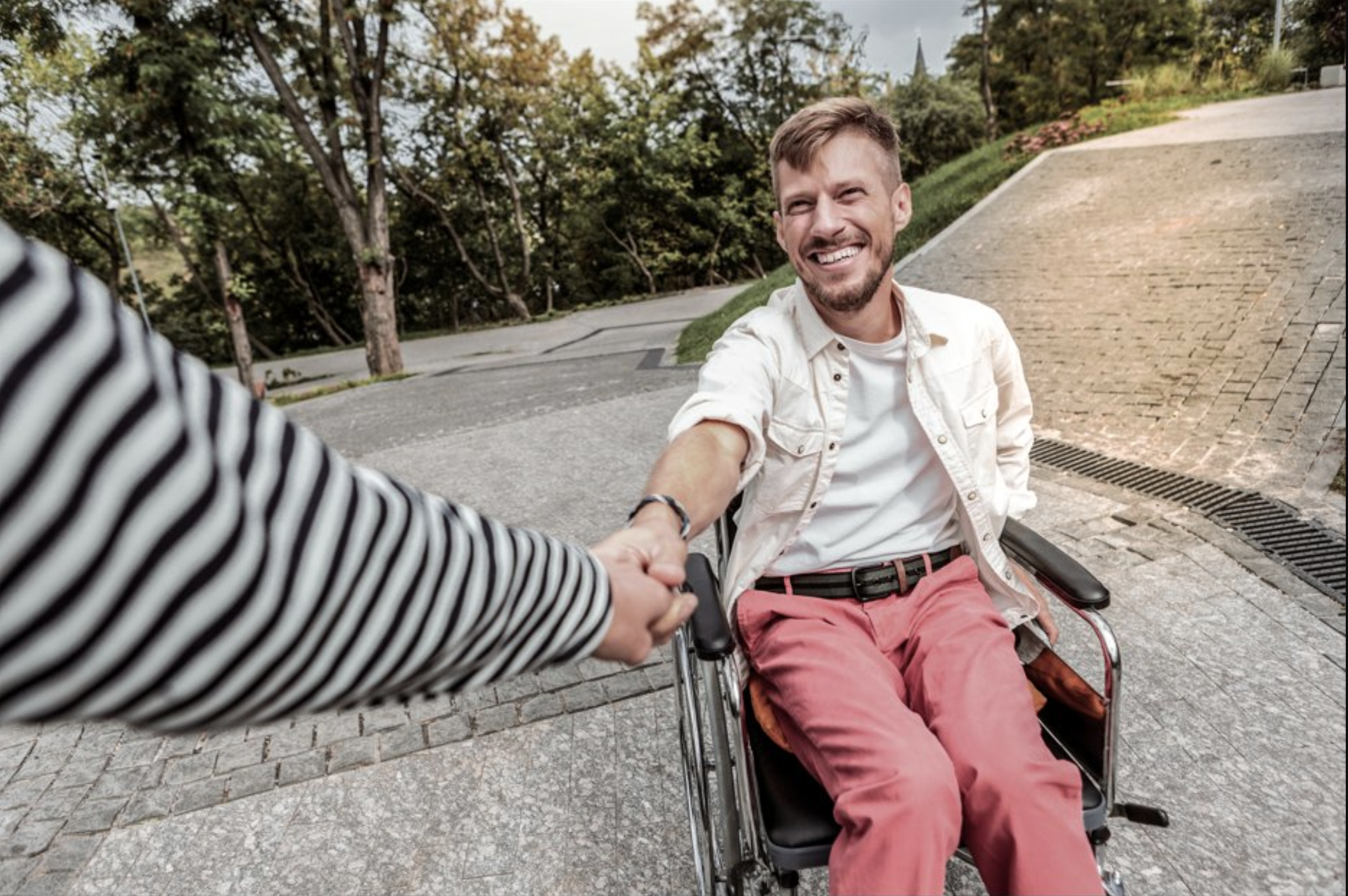Rachel Booth-Gardiner and Georgia Vine are occupational therapists with lived experiences of disabilities and founding members of the lived experience disability network AbleOTUK.
For Disability History Month 2024, they explore the history of disabled healthcare professionals, celebrate the achievements of AbleOTUK and review the sections of the HCPC standards relating to equality, diversity and inclusion.

UK Disability History Month, observed from 18 November to 20 December this year, focuses on the theme ‘Disability, Livelihood, and Employment’. Since its launch in 2010, the month has provided a platform to recognise the contributions of disabled individuals while addressing the inequalities they encounter.
Disability History Month reminds us of the invaluable contributions of disabled individuals to healthcare. Disability is not a limitation but a spectrum of diverse experiences that enrich our professions and society. This includes invisible disabilities such as neurodivergence, chronic illnesses, and mental health conditions, which often require increased awareness and understanding to foster inclusivity.
This year’s theme references the systemic barriers disabled people face in accessing fair opportunities for work and economic independence. It highlights the historical and ongoing struggles for inclusive employment, challenges stereotypes, celebrates resilience, and advocates for meaningful change to remove barriers in all aspects of working life.
Disabled healthcare professionals are integral to this narrative, as they challenge misconceptions and demonstrate innovation, expertise, and perseverance in their roles.
What do we mean by disability?
Disability encompasses a diverse range of physical, cognitive, sensory, and mental health conditions that can affect a person’s daily life and interactions with the world, both visible and invisible.
This includes neurodivergent conditions, chronic illnesses, mental health conditions, hearing and vision impairments, as well as sensory processing differences.
Understanding the wide scope of disability, including invisible conditions, is essential for fostering a truly inclusive and equitable society. By recognising that societal barriers, rather than individual impairments, are often the greatest challenges faced by disabled people, we can strive to create environments that prioritise equity and inclusion.
HCPC requirements around inclusivity
As registrants of the HCPC, it is essential to consider how disability intersects with professional practice for clients and colleagues.
The HCPC has several standards relating to inclusivity that registrants are required to meet. These aim to enhance the experiences of disabled individuals and improve outcomes for them, both as service users and professionals. They aim to embed inclusivity, ensure equitable care, and support disabled professionals in their practice.
The HCPC standards of conduct, performance and ethics and standards of proficiency require registrants to ensure their practice is fair for all service users. This includes treating service users and carers as individuals, respecting their privacy and dignity, understanding and applying equality legislation and recognising the potential impact that personal biases could have on service users and others.
They also contain standards on health conditions and disabilities, requiring registrants to assess whether changes in their physical or mental health will impact their ability to practise safely and effectively. If necessary, they must make adjustments to maintain safety and effectiveness.
The HCPC provides resources for registrants with health conditions or disabilities, including guidance on disclosing conditions and making reasonable adjustments. These aim to support disabled professionals in practising safely and effectively.
The history of disabled healthcare professionals
Disabled individuals have made significant contributions to healthcare throughout history, often overcoming systemic barriers to achieve professional success.
In the 19th century, figures like John Langdon Down revolutionised care for individuals with Down syndrome, challenging societal misconceptions about intellectual disabilities. In more recent times, disabled professionals have led efforts to dismantle barriers and improve accessibility, enriching healthcare with their unique perspectives.
Yet, myths persist, such as the belief that disabled individuals cannot meet the demands of healthcare roles. These misconceptions fail to account for the lived expertise of disabled professionals, whose contributions foster diversity, empathy, and innovation in healthcare.
Professor Mike Oliver (1945–2019) was a sociologist and disability rights advocate who transformed how society views disability. A wheelchair user following a spinal injury in 1962, Oliver became the world’s first Professor of Disability Studies and developed the social model of disability. This model emphasises that disability arises not from individual impairments, but from societal barriers and attitudes that restrict inclusion.
Oliver's work influences disabled professionals and challenges healthcare systems to focus on removing barriers rather than limiting individuals.
The founding of AbleOTUK
AbleOTUK was established to create a supportive and empowering space for disabled occupational therapists to connect, share experiences, and advocate for change. Recognising the unique challenges disabled professionals face, the organisation aims to foster community and challenge ableist practices within the profession.
Since its inception, AbleOTUK has achieved significant milestones in advocating for disabled professionals, including:
- Policy and Advocacy: Challenging ableist practices and advocating for equitable recruitment, education, and workplace adjustments.
- Representation: Sharing lived experiences to shift perceptions and highlight the strengths and contributions of disabled professionals.
- Collaboration: Partnering with organisations such as the Royal College of Occupational Therapists (RCOT) and the HCPC to promote inclusivity and encourage disabled individuals to enter the profession.
- Empowering Members: Creating a safe space for disabled occupational therapists to exchange ideas and advocate for systemic change.
We (Rachel and Georgia) are both members of AbleOTUK.
Georgia is a founding member, and has worked with the HCPC to make its registration process more inclusive for disabled professionals. Georgia also published her book Occupational Therapy, Disability Activism, and Me: Challenging Ableism in Healthcare this year, amplifying the voices of disabled healthcare professionals and advocating for systemic change.
Rachel has shared her lived experiences of being hospitalised during the pandemic and recovering from COVID-19 as someone with pre-existing disabilities. Her recovery was complicated by healthcare professionals who failed to fully appreciate the complexities of her disabilities and how these affected her recovery. Rachel has presented her experiences at national conferences and through her blog, OT_Rach: Exploring the Art of Occupation, where she advocates for holistic approaches to supporting disabled individuals in healthcare.
Conclusion
Disability History Month reminds us of the invaluable contributions of disabled individuals to healthcare. Disability is not a limitation but a spectrum of diverse experiences that enrich our professions and society. This includes invisible disabilities such as neurodivergence, chronic illnesses, and mental health conditions, which often require increased awareness and understanding to foster inclusivity.
As HCPC registrants, fostering inclusivity is an ethical responsibility and a professional imperative.
By learning from the pioneering work of individuals like Professor Mike Oliver, the achievements of Georgia Vine, and the advocacy of AbleOTUK, and by embracing the HCPC’s standards, we can work towards a healthcare system that values the voices and experiences of all professionals, regardless of ability.
By celebrating these contributions and changes, we honour the past and commit to creating a future where disabled professionals, including those with invisible disabilities, can thrive.
To learn more about AbleOTUK, visit their website or follow them on X/Twitter.
To learn more about Disability History month, visit their website.

